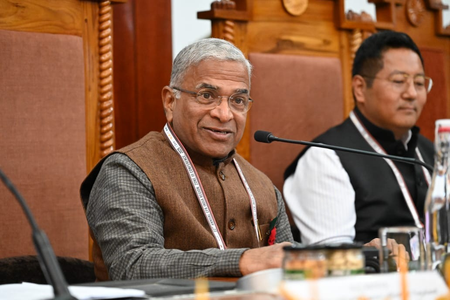

Kohima, Nov 11 (IANS) Rajya Sabha Deputy Chairman Harivansh on Tuesday called upon legislatures to play a proactive role in planning for structural shifts caused by climate change, not merely adapting but also preventing future damages through resilient policy frameworks.
Addressing the 22nd Annual Commonwealth Parliamentary Association (CPA), India Region Zone–III, second-day conference in Kohima, the Deputy Chairman stressed the collective commitment to strengthening parliamentary democracy and fostering sustainable and inclusive development across the Northeastern region. Harivansh noted that India@2047 is not merely a milestone but a continuing journey marked by smaller, measurable goals tailored to each state’s unique needs.
He praised members from across the region who shared insightful perspectives during the plenary discussions, particularly Assam Speaker Biswajit Daimary, who underscored the need to raise awareness on the meaning of Viksit Bharat at the constituency level.
Harivansh observed that as India’s economy evolves, the nature of work and employment will also transform. Legislatures, therefore, have a crucial role not just in framing policies but also in guiding citizens through this socio-economic transition.
Citing the Deputy Speaker of Sikkim, Harivansh lauded the state’s exemplary achievement in becoming India’s first fully organic state in 2016, demonstrating how economic growth can be aligned with environmental sustainability and the national Sustainable Development Goals.
Highlighting the Union government’s sustained focus on the Northeast, Harivansh said that 10 per cent of the Union Budget is earmarked for the region.
From 2017 to August 2023, the Ministry of DoNER has supported 126 Externally Aided Projects worth Rs 1.35 lakh crore, while the Department of Economic Affairs has recommended 124 projects worth Rs 1.26 lakh crore for external funding during the last decade.
He stressed that the real impact of these initiatives depends on effective legislative oversight and accountability.
“Legislatures must ensure there is proper monitoring and that implementation matches intent,” he remarked.
Quoting Meghalaya Speaker Metbah Lyngdoh, he said that addressing inefficiencies in land and labour laws and ensuring inclusivity will strengthen investor confidence and attract new opportunities to the region.
He urged every state legislature to hold annual discussions on Viksit Bharat, focusing on policy reviews that drive long-term development.
He also noted that improved infrastructure, the rise of agro-processing industries, and eco-tourism in the North East are already yielding promising growth outcomes, adding that the Prime Minister’s emphasis on the Act East Policy places the region at the centre of India’s development vision.
Acknowledging the progressive approach of Northeastern legislatures in embracing technology, Harivansh emphasised that innovation and research will play a defining role in shaping governance and economic growth.
Deputy Chairman also underlined the region’s unique ecological challenges, recalling Nagaland Chief Minister Neiphiu Rio’s remarks on the delicate balance between abundant natural resources and the limitations on their commercial use. He urged that the dialogue on environmental protection and sustainable development must continue through the next decade.
Drawing from his visit to Khonoma Village, Asia’s first green village, Harivansh praised it as a “living example of sustainable living,” noting that small individual actions can collectively make a significant difference in protecting the environment.
Referring to discussions during the session on climate change, Harivansh observed that natural disasters in the Northeast demonstrate how environmental shocks can cause profound social and economic disruptions.
He called upon legislatures to play a proactive role in planning for structural shifts caused by climate change, not merely adapting but also preventing future damages through resilient policy frameworks.
The Commonwealth Parliamentary Association (CPA) was founded in 1911. It is the same year in which Delhi was made the capital of India during the British Raj. The CPA facilitates collaboration among its members through conferences, workshops, and the sharing of knowledge and best practices.
And as an international organisation, the CPA is made up of over 180 legislatures from 53 Commonwealth countries, including national, state, and territorial parliaments.
Presently, the Commonwealth is home to 2.7 billion people. Over half of them are from India, now the most populous country in the world.
“Prime Minister Narendra Modi has a Vision to make India a developed country by the year 2047 with a 10 Trillion Dollar economy. If we are to realise Vision 2047, a sustained high GDP and per capita income growth has to be achieved by devising policies that foster innovation and self-reliance through local capacity building while ensuring social inclusion and equity by reducing poverty and inequality, ensuring universal access to quality healthcare and education, achieving gender equality, and bridging the urban-rural divide,” Rajya Sabha Deputy Chairman added.
India needs to have localised solutions and software ready not only to act as a substitute but to counter the dependence, like China does, that will protect us in a situation of the US blocking access to its software, as we saw recently.
A lot of progress has been made in terms of the size of the economy, and various other socio-economic, health and development parameters corroborate what is obvious and manifest to all, he said.
–IANS
sc/dan
